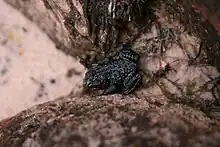Oreophrynella nigra
Oreophrynella nigra, or pebble toad,[3] is a species of toad in the family Bufonidae. It is endemic to the Guiana Highlands in Bolívar State, Venezuela, and known from two tepuis, Kukenan-tepui and Yuruani-tepui, both belonging to the Eastern Tepuis.[1][4]
| Oreophrynella nigra | |
|---|---|
 | |
| Scientific classification | |
| Domain: | Eukaryota |
| Kingdom: | Animalia |
| Phylum: | Chordata |
| Class: | Amphibia |
| Order: | Anura |
| Family: | Bufonidae |
| Genus: | Oreophrynella |
| Species: | O. nigra |
| Binomial name | |
| Oreophrynella nigra | |
Description and behaviour
It is a small species of toad: males measure 16.5–23.5 mm (0.65–0.93 in) and females 20.4–30 mm (0.80–1.18 in) in snout–vent length.[2]
When threatened, the toad folds its limbs under its body, tucks its head in and tenses in a ball shape. If on an incline (this is how it gets its name), this causes it to roll down the slope, escaping the attention of its predator, and looking like a dislodged pebble. Its cryptic black and dark grey coloring that may appear as dark navy blue to some blends with its sandstone habitat.[3]
Habitat and conservation
Its natural habitats are rocks and peat bogs in montane tepui environments at elevations of 2,300–2,700 m (7,500–8,900 ft) asl. It is classified as vulnerable because of its apparently restricted range.[1]
References
- IUCN SSC Amphibian Specialist Group (2020). "Oreophrynella nigra". IUCN Red List of Threatened Species. 2020: e.T54852A109530338. doi:10.2305/IUCN.UK.2020-3.RLTS.T54852A109530338.en. Retrieved 14 November 2021.
- Señaris, J. C.; J. Ayarzagüena & S. J. Gorzula (1994). "Los sapos de la familia Bufonidae (Amphibia: Anura) de las tierras altas de la Guayana Venezolana: Descripción de un nuevo genero y tres especies". Publicaciones de la Asociación de Amigos de Doñana. 3: 1–37.
- Pebble toad's rock and roll life, Matt Walker, BBC, 15 October 2009, Retrieved 6 November 2015
- Frost, Darrel R. (2015). "Oreophrynella nigra Señaris, Ayarzagüena, and Gorzula, 1994". Amphibian Species of the World: an Online Reference. Version 6.0. American Museum of Natural History. Retrieved 8 November 2015.
